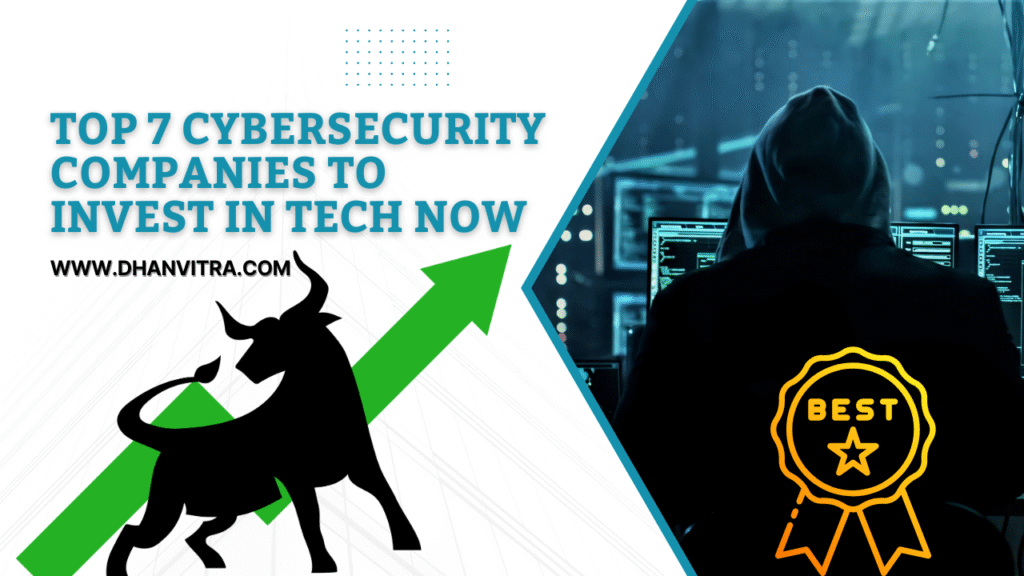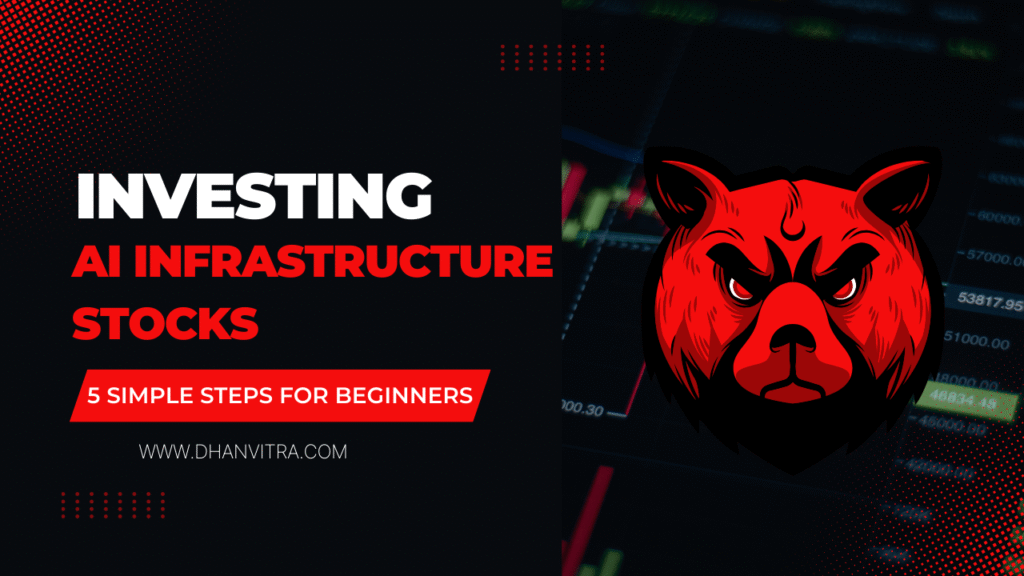
In today’s rapidly evolving digital economy, one sector has emerged as both a necessity and an opportunity: cybersecurity. As cyberattacks become increasingly frequent and sophisticated, businesses, governments, and individuals are investing heavily in digital protection.
At Dhanvitra, we believe in helping investors like you stay ahead of the curve. That’s why, in this blog, we’re diving deep into the Top 7 Cybersecurity Companies to Invest in Tech Now. These companies are not only safeguarding the digital world but also creating long-term growth opportunities for smart investors. Whether you’re new to investing or looking to diversify your portfolio, understanding the cybersecurity boom can help you make more informed and profitable decisions.
So, let’s explore why cybersecurity is more than just a tech trend—it’s a powerful investment avenue you can’t afford to ignore.
Table of Contents
Understanding the Cybersecurity Boom
Cybersecurity is no longer just a buzzword—it has become the backbone of modern digital life. Every time you log into your bank account, order groceries online, or send a confidential email, you are part of an ecosystem that needs to be protected from cyber threats. The boom in this industry didn’t happen overnight. Over the last decade, the rise of cloud computing, remote work, and digital transformation has created an environment where cybercriminals thrive. As businesses have moved their operations online, hackers have found new opportunities to exploit vulnerabilities.
Global cybercrime damages are projected to cost trillions of dollars in the coming years, making cybersecurity one of the most urgent needs for governments, corporations, and individuals alike. What’s driving the boom is simple—every sector, from healthcare to finance to e-commerce, relies on technology, and technology cannot function safely without protection.
Another factor fueling this growth is regulation. Governments worldwide are tightening security laws, requiring organizations to invest in stronger systems. From Europe’s GDPR to the United States’ CCPA, compliance is no longer optional—it’s mandatory. And for investors, this translates into continuous spending on cybersecurity solutions, ensuring steady growth for the companies providing them. In short, cybersecurity isn’t just another industry trend; it’s becoming a permanent fixture of the global economy.
Why You Should Consider Investing in Cybersecurity Stocks
When it comes to picking industries that promise long-term growth, cybersecurity is at the top of the list. Unlike some sectors that fluctuate with consumer preferences, cybersecurity isn’t a “want”—it’s a need. Businesses cannot afford to cut costs on protecting sensitive data because the risks of a breach—financial losses, legal penalties, and reputational damage—are too high. This creates a level of resilience that makes cybersecurity companies highly attractive to investors.
The increasing frequency of attacks also guarantees that demand for these services will only grow. Think of it like this: the more burglars there are in a neighborhood, the more valuable locks and alarm systems become. The same principle applies online. As cyber threats evolve, companies will continuously upgrade their defenses, fueling consistent revenue streams for cybersecurity firms.
What makes this industry even more appealing is its ability to innovate. Many leading cybersecurity firms are integrating artificial intelligence and machine learning into their platforms, making them proactive rather than reactive. This means companies don’t just respond to attacks—they anticipate them. Such innovation not only strengthens the industry but also adds a competitive edge that can drive stock values higher.
Investing in cybersecurity stocks isn’t about short-term gains—it’s about positioning yourself in a sector that will remain essential for decades to come. Whether the economy is booming or slowing down, organizations cannot compromise on digital security, making cybersecurity stocks a potential safe harbor for investors.
Key Factors to Evaluate Before Investing
Before diving into cybersecurity stocks, it’s important to understand that not every company in this sector is created equal. Just because a company operates in a high-demand industry doesn’t automatically make it a good investment. Careful evaluation of a few critical factors can help you identify which stocks have true staying power.
First, look at market share and leadership. Companies that hold significant market share or dominate specific niches often have stronger growth potential. Leadership matters too. A firm with visionary leaders who anticipate technological shifts usually stays ahead of the competition.
Next, consider innovation and product offerings. Cybersecurity threats change rapidly, and only companies that consistently update their products can remain relevant. Firms investing heavily in research and development, particularly in areas like AI-driven security, cloud protection, and zero-trust architecture, are more likely to thrive.
Financial health is another key indicator. A company with strong revenue streams, low debt, and consistent profitability offers more stability. Earnings reports can reveal whether growth is sustainable or if it’s driven by temporary spikes. Similarly, a diverse client base—spanning industries and regions—reduces reliance on a single market and adds resilience.
Lastly, pay attention to strategic partnerships and acquisitions. Many cybersecurity companies expand their capabilities by collaborating with cloud providers, hardware manufacturers, or even government agencies. These alliances not only boost credibility but also open doors to larger markets.
Investing in cybersecurity is about recognizing the companies that combine strong fundamentals with innovation. By focusing on these factors, investors can better identify which firms will shape the future of digital defense—and which ones may struggle to keep up.
Top 7 Cybersecurity Companies to Invest in 2025
Palo Alto Networks (PANW)
Palo Alto Networks has long been a household name in cybersecurity. The company is widely recognized for its next-generation firewalls and a suite of cloud-based security products that cater to enterprises worldwide. What sets Palo Alto apart is its ability to integrate AI-driven threat detection into its systems, allowing businesses to respond faster to potential risks.
Investors love Palo Alto because of its consistent revenue growth and expansion across cloud security markets. As organizations shift more of their infrastructure to the cloud, Palo Alto is perfectly positioned to capitalize on this wave. Its robust financials and reputation as a market leader make it one of the most reliable long-term investments in cybersecurity.
CrowdStrike Holdings (CRWD)
CrowdStrike has built its name on being cloud-native from day one. Its Falcon platform is a game-changer in endpoint protection, using artificial intelligence to detect and prevent threats in real time. In a world where remote work is the new normal, endpoint security has never been more critical.
For global investors, CrowdStrike represents innovation and adaptability. Its subscription-based revenue model ensures steady cash flow, while its rapid adoption among Fortune 500 companies shows the level of trust the market has in its services. CrowdStrike is not just keeping up with the industry—it’s setting the pace.
Fortinet (FTNT)
Fortinet is another heavyweight that commands respect. Known for its wide-ranging product line, from firewalls to intrusion prevention systems, Fortinet provides solutions across multiple layers of digital defense. Its cost-effective approach has made it especially appealing in regions where companies want maximum protection without overspending.
What makes Fortinet a strong investment choice is its balance of affordability and performance. Unlike some premium-only vendors, Fortinet’s ability to cater to businesses of all sizes—from startups to multinationals—gives it a broader market reach. The company has consistently delivered strong earnings, which signals stability for long-term investors.
Check Point Software Technologies (CHKP)
Check Point, based in Israel, is one of the pioneers in the cybersecurity industry. With decades of experience, the company has continually adapted to new threats while maintaining a reputation for reliability. Its hybrid approach, blending legacy security tools with cutting-edge innovations, appeals to enterprises that value both stability and forward-thinking solutions.
For investors, Check Point offers a unique blend of tradition and evolution. It may not grow as explosively as some younger players, but its steady earnings, strong client base, and proven expertise make it a “safe harbor” option for conservative investors looking for long-term resilience.
Zscaler (ZS)
Zscaler is the poster child for zero-trust security, an approach that assumes no user or device should ever be trusted until verified. As more businesses adopt cloud-first strategies, Zscaler’s services become indispensable. The company has carved out a dominant space in securing cloud connections and protecting enterprise traffic.
Investors are drawn to Zscaler for its growth trajectory. Its revenue growth has been impressive, driven by high demand for secure remote access. While it is a relatively younger player compared to giants like Palo Alto, its rapid innovation makes it an exciting stock for growth-focused investors.
Okta Inc. (OKTA)
Okta is synonymous with identity and access management, an area of cybersecurity that’s gaining enormous traction. As companies expand across cloud platforms and hybrid work becomes mainstream, controlling who gets access to what data has never been more important.
Okta’s edge lies in its user-friendly solutions that work seamlessly across platforms. From small businesses to large enterprises, organizations rely on Okta to simplify identity verification without compromising security. For investors, Okta’s expansion into international markets and its growing ecosystem partnerships signal a bright future.
Cloudflare (NET)
Today, it not only boosts website performance but also shields companies from distributed denial-of-service (DDoS) attacks, phishing, and other online threats.
What excites investors about Cloudflare is its dual role in security and performance. It sits at the intersection of speed and safety, offering a unique value proposition that very few competitors can match. With an ever-growing global customer base, Cloudflare is one of the most dynamic companies to keep an eye on in 2025.
Comparing the Top 7 Cybersecurity Companies
Each of these companies has carved out its niche, and choosing the right one often depends on what type of investor you are. Palo Alto and Fortinet offer breadth with their comprehensive product lines, while CrowdStrike and Zscaler deliver speed and agility in adapting to new threats. Okta dominates the identity space, a field likely to grow as digital ecosystems expand. Cloudflare stands out for combining security with performance, and Check Point provides a steady, conservative option.
The beauty of cybersecurity investing lies in its diversity. Some firms are aggressive innovators pushing new frontiers, while others maintain a balanced approach, prioritizing steady earnings. Depending on whether you seek rapid growth or stable returns, your choice of company may vary.
Future of Cybersecurity Investments
The future of cybersecurity is intertwined with emerging technologies like artificial intelligence, machine learning, and automation. These innovations will not only help detect threats faster but also reduce human errors in security operations.
Another critical area is the expansion of zero-trust models, where companies shift from perimeter-based defense to more granular, identity-based security. With governments also tightening regulations on data privacy, companies that adapt quickly will benefit the most.
For investors, the future points to consolidation. Larger players are likely to acquire smaller startups with breakthrough technologies, which could present additional opportunities. Simply put, cybersecurity isn’t a temporary trend—it’s becoming as essential as healthcare or energy.
Risks Involved in Cybersecurity Stocks
Despite their strong potential, cybersecurity stocks aren’t without risks. The first is market volatility. Tech stocks, in general, can swing dramatically based on quarterly earnings or global events. Another challenge is competition. With so many companies vying for market share, not every player will emerge as a winner in the long term.
Additionally, cybersecurity firms are highly dependent on corporate IT budgets. During economic downturns, organizations may delay or cut back on security spending, which could impact earnings. Finally, rapid technological change means that even today’s leaders need to keep innovating or risk being overtaken.
For global investors, it’s essential to approach cybersecurity stocks with a mix of optimism and caution. Diversifying across multiple companies or even exploring cybersecurity-focused ETFs could help mitigate some of these risks while still benefiting from the industry’s growth.
Pro Tips for Smart Cybersecurity Investments
The industry is booming, but like any investment, it comes with risks. If you want to play it smart, here are some insights to keep in mind.
The first rule is to diversify your investments. Cybersecurity is a wide landscape, ranging from companies that focus on identity protection to those that specialize in cloud-based defenses. Putting all your money into one stock might feel tempting when you see it climbing, but spreading your portfolio across multiple players reduces your exposure to sudden downturns.
Another pro tip is to keep an eye on quarterly earnings reports. These aren’t just dry numbers on a financial statement—they’re the pulse of the company. How fast are they growing subscriptions? Are they renewing contracts with enterprise clients? Are they investing heavily in R&D to stay ahead of hackers? These details tell you more about the company’s future than the headlines ever will.
You’ll also want to follow industry trends closely. Cybersecurity isn’t static; it evolves with technology. Ten years ago, antivirus software was enough. Today, it’s all about cloud security, zero-trust models, and AI-driven threat detection. Tomorrow, it could be something entirely new. The companies that adapt quickest are the ones that will stay relevant and profitable.
Finally, don’t ignore the global angle. Cybercrime is not confined to one country—it’s a worldwide challenge. Look for companies with a strong international presence or partnerships in multiple regions. This kind of global footprint not only boosts revenue but also ensures they’re less dependent on a single economy.
Conclusion
The world we live in is more connected than ever, and with that connection comes vulnerability. Every swipe of a credit card, every login to a cloud account, and every transfer of sensitive data creates opportunities for hackers. That’s why cybersecurity is no longer just a technical necessity—it’s the backbone of trust in the digital era.
For investors, this translates into one of the most resilient growth markets of our time. The top cybersecurity companies aren’t just keeping businesses safe; they’re shaping the future of the internet itself. From giants like Palo Alto Networks to innovators like CrowdStrike and Cloudflare, these firms are leading the charge against the ever-changing world of cyber threats.
If you’re serious about long-term growth, cybersecurity is a sector that deserves a place in your portfolio. Of course, the key is to invest wisely—balancing risk with opportunity, keeping an eye on the bigger picture, and staying updated as the industry shifts. Remember, investing in cybersecurity isn’t just about chasing profits; it’s about backing the companies that keep our digital lives safe. And in today’s world, what could be more valuable than that?
FAQs
Is cybersecurity a good long-term investment?
Absolutely. Cybersecurity isn’t a trend that will fade; it’s a necessity in a world where digital systems run everything from banking to healthcare. As technology grows, so does the need for protection, making it a solid long-term sector for investors.
Which cybersecurity stock is safest for beginners?
If you’re new to investing, established companies with strong financials and consistent growth, like Palo Alto Networks or Fortinet, are safer bets. They’ve been around long enough to prove stability while still offering room for growth.
How big will the cybersecurity industry be in the next 5 years?
Analysts project the global cybersecurity market to exceed $500 billion by 2030, with steady annual growth. This means the industry will likely outpace many traditional tech sectors in terms of expansion.
Should I consider investing in cybersecurity (ETFs) rather than in individual stocks?
If you don’t want to pick individual winners, cybersecurity-focused ETFs (Exchange-Traded Funds) are a great option. They spread your investment across multiple companies, reducing risk while still giving you exposure to the sector.
What’s the biggest risk when investing in cybersecurity companies?
The biggest risks are market volatility and competition. New players can disrupt the market, and economic downturns may reduce corporate spending on IT. However, because cybersecurity is mission-critical, it usually bounces back faster than other tech segments.










Really appreciate this roundup of top cybersecurity firms! It’s fascinating to see where tech is heading and which players are leading the charge.
Great insights on the top cybersecurity companies! It’s crucial to stay ahead in this ever-evolving tech landscape. Excited to see how these firms shape the future of security!
This list is super helpful! Investing in cybersecurity feels like a no-brainer given today’s digital risks. Looking forward to seeing how these companies innovate!
Thanks for breaking down the best cybersecurity investments! With cyber threats on the rise, it’s smart to keep an eye on these companies. Definitely taking notes!
Awesome blog! Cybersecurity is such an important field right now, and your recommendations are spot-on. Can’t wait to dive deeper into these companies!